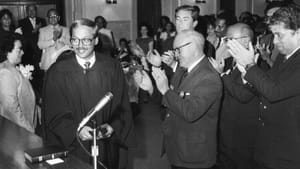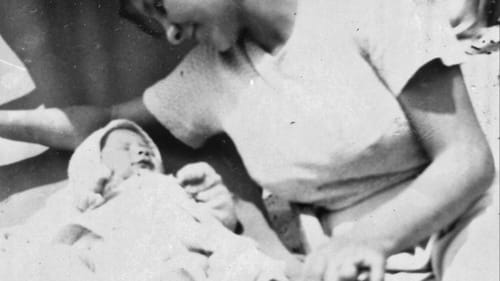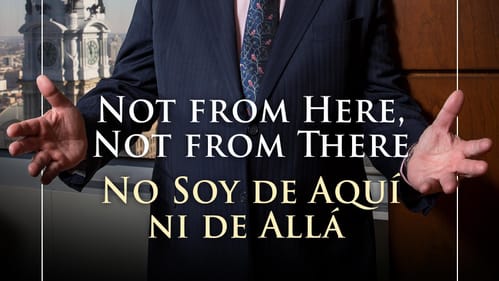Stay in the Loop
BSR publishes on a weekly schedule, with an email newsletter every Wednesday and Thursday morning. There’s no paywall, and subscribing is always free.
The first, and not the last
‘Not from Here, Not from There (No Soy de Aquí, ni de Allá)’ by Nelson Díaz

Nelson Díaz has been a presence in Philadelphia since 1969, and a leader of its Latinx community almost as long. His new autobiography, Not from Here, Not from There (No Soy de Aquí ni de Allá) traces his remarkable career. He’s served as public defender, judge, city solicitor, and in 2014, mayoral candidate, and worked at the federal level in the Carter and Clinton administrations.
None of which he planned: Having a gift for numbers, he thought he’d be an accountant when he graduated from St. John’s University, and never expected his path into law and public service.
His book’s title refers to his Puerto Rican heritage. “I am an American and a colonized person at the same time,” Díaz writes, “a stranger in my own country and a citizen of an island where I have never lived. I have never been truly at home or accepted in either place.”
“A clean, safe place to live”
Díaz’s mother, Maria Cancel, became pregnant at age 20 by a married man whom Díaz would not meet for a decade. She migrated alone to the mainland from Puerto Rico in 1947. She had been a maid since she was 13, had little education, and spoke no English. She settled in the Bronx.
Poverty and substandard housing were facts of Díaz’s early life. After his mother married and his sister was born, the family moved to crowded, rat-infested housing in West Harlem. Díaz describes police rousting people “for no discernable reason other than that they were poor and Latino.” But there were other dangers, too: He was five when a man in his building molested him.
Recalling the family’s fortunate relocation to new public housing, Díaz writes, “My belief in everyone’s right to a clean, safe place to live was born in those buildings.”

Speaking only Spanish, Díaz quickly became overwhelmed in school. The language barrier, intensified by his inquisitive, mischievous nature, placed him in the crosshairs of teachers and his mother. Desperate to belong, he joined the Boy Scouts and the choir, as well as a gang, which compounded his troubles. That rough start, however, informed the activist he would become.
From the Bronx to the White House
Diaz’s commitment to housing, education, and equal opportunity propelled him through positions as advocate, lawyer, and jurist. In the 1970s, to gain a national perspective on the issues he cared about, Díaz applied for a White House Fellowship and worked in the office of Vice President Walter Mondale. Almost two decades later, he served as general counsel in the Department of Housing and Urban Development at the request of HUD Secretary Henry Cisneros.
Díaz’s list of mentors and colleagues is a virtual who’s-who of civic leaders, among them Peter Liacouras of Temple University, Charles Bowser of the Urban Coalition, and Ed Rendell, who as district attorney encouraged the 33-year-old Díaz to run for the bench. He became the first Latinx judge in Pennsylvania. But it was Mayor John Street who gave Díaz his most enjoyable assignment: city solicitor. “I argued cases…I negotiated contracts…I interpreted policy,” he writes. “City solicitor was a job that could make a big impact, and I had more fun as city solicitor than I had had in any other job I ever held.”
A mother’s faith
Notable names aside, Díaz counts his mother as having the greatest influence on him: “This was how my mother raised me, time and again chasing me down, shoving and hectoring me into making good decisions against my own worst instincts.”
To get Díaz away from the gang, she persuaded him to accompany her to the Pentecostal church she had joined. Though Catholic, Maria had felt alienated by the straitlaced style of New York’s Irish-dominated church. She responded to the livelier Spanish-language services, and Díaz did too. “I became a much better Catholic when I became an undercover Pentecostal,” he writes. And he quit the gang.

The first, and not the last
Díaz has been the first Puerto Rican or Latinx person in a series of jobs and says he was mindful of not being the last. As Temple’s first Latino law student, he cofounded the Black Law Students' Association and the Federation of Puerto Rican Students to address cultural bias. Later, he cofounded Temple Legal Aid Program, through which law students represent indigent clients.
He’s worked for economic opportunity, heading the Spanish Merchants' Association, which connected small businesses with financial and professional resources; founding the Hispanic Association of Contractors and Enterprises; and serving on economic and community development boards.
In 1990, Díaz was appointed administrative judge by the Pennsylvania Supreme Court and given the difficult task of taming Philadelphia’s over-budget, inefficient, and severely backlogged Court of Common Pleas.
The personal side
The most revealing parts of the narrative, which hopscotches through Díaz’s resume, are the personal encounters with people like former Philadelphia mayor Frank Rizzo, evangelist Billy Graham, and Leroy Otis, a homeless man in West Harlem who coached Díaz and other neighborhood kids in softball. Stories of Díaz’s parents are included throughout, but he writes little of his three children.
The island, culture, and diaspora of Puerto Rico figure prominently throughout the book, particularly at beginning and end, where Díaz discusses the dire situation after Hurricane Maria in 2017. Though this section is not incorporated as smoothly as it might have been, it signifies how strongly Díaz still connects to the people of a land in which he never lived.
What, When, Where
Not from Here, Not from There (No Soy de Aquí ni de Allá): The Autobiography of Nelson A. Díaz. By Nelson Díaz. Philadelphia, PA: Temple University Press, 2018. 280 pages, hardcover; $32.95, click here.
Sign up for our newsletter
All of the week's new articles, all in one place. Sign up for the free weekly BSR newsletters, and don't miss a conversation.
